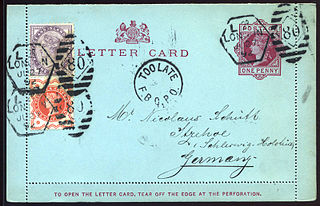Related Research Articles

Philately is the study of postage stamps and postal history. It also refers to the collection and appreciation of stamps and other philatelic products. While closely associated with stamp collecting and the study of postage, it is possible to be a philatelist without owning any stamps. For instance, the stamps being studied may be very rare or reside only in museums.

Stamp collecting is the collecting of postage stamps and related objects. It is an area of philately, which is the study of stamps. It has been one of the world's most popular hobbies since the late nineteenth century with the rapid growth of the postal service, as a stream of new stamps was produced by countries that sought to advertise their distinctiveness through their stamps.

A cancellation is a postal marking applied on a postage stamp or postal stationery to deface the stamp and to prevent its reuse. Cancellations come in a huge variety of designs, shapes, sizes, and colors. Modern cancellations commonly include the date and post office location where the stamps were mailed, in addition to lines or bars designed to cover the stamp itself. The term "postmark" refers specifically to the part that contains the date and posting location, but the term is often used interchangeably with "cancellation" as it may serve that purpose. The portion of a cancellation that is designed to deface the stamp and does not contain writing is also called the "obliteration" or killer. Some stamps are issued pre-cancelled with a printed or stamped cancellation and do not need to have a cancellation added. Cancellations can affect the value of stamps to collectors, positively or negatively. Cancellations of some countries have been extensively studied by philatelists, and many stamp collectors and postal history collectors collect cancellations in addition to the stamps themselves.
The Scott catalogue of postage stamps, published by Scott Publishing Company, now a subsidiary of Amos Media, is updated annually and lists all the stamps of the world that its editors recognize as issued for postal purposes. It is published in fourteen large volumes that include twelve volumes containing all the countries of the world that have ever issued postage stamps, the United States Specialized Catalog, and the 1840–1940 Classic Specialized Catalogue. The numbering system used by Scott to identify stamps is dominant among stamp collectors in the United States, Canada and Mexico.

A piece of postal stationery is a stationery item, such as a stamped envelope, letter sheet, postal card, lettercard, aerogram or wrapper, with an imprinted stamp or inscription indicating that a specific rate of postage or related service has been prepaid. It does not, however, include any postcard without a pre-printed stamp, and it is different from freepost for preprinted cards issued by businesses. In general, postal stationery is handled similarly to postage stamps; sold from post offices either at the face value of the printed postage or, more likely, with a surcharge to cover the additional cost of the stationery. It can take the form of an official mail issue produced only for the use of government departments.

Indian postal systems for efficient military and governmental communications had developed long before the arrival of Europeans. When the Portuguese, Dutch, French, Danish and British conquered the Marathas who had already defeated the Mughals, their postal systems existed alongside those of many somewhat independent states. The British East India Company gradually annexed the other powers on the sub-continent and brought into existence a British administrative system over most of modern-day India, with a need to establish and maintain both official and commercial mail systems.

A stamp catalog is a catalog of postage stamp types with descriptions and prices.

The postage stamps and postal system of the Confederate States of America carried the mail of the Confederacy for a brief period in U.S. history. Early in 1861 when South Carolina no longer considered itself part of the Union and demanded that the U.S. Army abandon Fort Sumter, plans for a Confederate postal system were already underway. Indeed, the Confederate Post Office was established on February 21, 1861; and it was not until April 12 that the American Civil War officially began, when the Confederate Army fired upon U.S. soldiers who had refused to abandon the fort. However, the United States Post Office Department continued to handle the mail of the seceded states as usual during the first weeks of the war. It was not until June 1 that the Confederate Post Office took over collection and delivery, now faced with the task of providing postage stamps and mail services for its citizens.

Edward Benjamin Evans, a British army officer also known as "Major Evans", was a distinguished philatelist, stamp collector, and philatelic journalist. His philatelic specialization included Mauritius, the Confederate States of America, the Mulready envelopes, and the Indian feudatory states.
Harrison Donald Seaman Haverbeck or H.D.S. Haverbeck, FRPSL, RDP, was a noted philatelist and philatelic journalist, whose interests centered on India and Indian states, Tibet and Nepal.

The postage stamps and postal history of Israel is a survey of the postage stamps issued by the state of Israel, and its postal history, since independence was proclaimed on May 14, 1948. The first postage stamps were issued two days later on May 16, 1948. Pre-1948 postal history is discussed in postage stamps and postal history of Palestine.

Lawrence Lewis Shenfield was an advertising executive who was instrumental in promoting the development of radio broadcasting during its golden age of the 1920s and 1930s. Larry lined up sponsors to help further the popularity of such stars as Orson Welles and Dinah Shore. After his retirement, Larry developed a second career as a prominent philatelist internationally recognized in the field of postal history. His careful studies of the postage stamps and postal history of the Confederate States are relied upon by stamp collectors and experts in philately to the present day.
The Stamp Specialist is the title of a series of books on philatelic research written and edited for the advanced collector of postage stamps.

August Dietz was a philatelist, editor and publisher, who specialized in the study of mail and postal history of the Confederate States of America.
John Robert Boker Jr. was an American philatelist who amassed some of the most prestigious collections of 19th century stamps ever seen by stamp collectors. Before his death in 2003, the Collectors Club of New York declared him, in 1996, to be the "outstanding philatelist of the last half of the twentieth century."
Society for Czechoslovak Philately (SCP) is a philatelic organization dedicated to the collection and study of the postage stamps and postal history of Czechoslovakia, the Czech Republic and Slovakia.
Patricia A. Kaufmann is an American philatelist, focusing on postage stamps and postal history of the Confederate States of America (CSA).

Edward Spring Knapp, of New York City, was a philatelist known for his remarkable collections of postage stamps and postal history.
The Confederate Stamp Alliance is a philatelic organization dedicated to the collection and study of postage stamps and postal history of the Confederate States of America (CSA). It is an affiliate of the American Philatelic Society.
Francis J. (Frank) Crown, Jr. of Capshaw, Alabama, is a noted collector of postage stamps and postal history of the Confederate States of America. He is a retired United States military officer.
References
- Jerry S. Palazolo Archived 2009-11-13 at the Wayback Machine